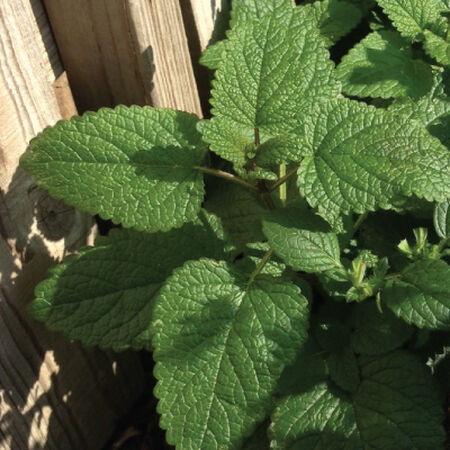Common, Lemon Balm Seeds
Key Attributes
Key Attributes
Product Details
Weight
0.009Depth
0.1Height
4.5Width
3.25Plant Height
24"Botanical Name
Melissa officinalisSeed Type
SeedSeeds Per Gram
1,411Seeds Per Pound
640,000Packet
500 SeedsSow Depth
1/4"Seeds Per Ounce
40,000Breed
Open-pollinatedSun
Full SunLife Cycle
PerennialCategories
HerbDays To Maturity (# Days)
90Components
Growing Instructions
![]() Learning Download: How to Grow Lemon Balm
Learning Download: How to Grow Lemon Balm
Lemon balm is a member of the mint family and is a perennial herb, which means it comes back each year. Its leaves look similar to that of a mint plant, but they have a slight lemon smell. Lemon balm also produces small white flowers. In addition to its edible leaves and nice fragrance, lemon balm will attract bees and other pollinators
to the garden.
Before Planting: Plant lemon balm after all dangers of frost has passed. The herb can be started indoors six to eight weeks before the last frost and then transplanted into the garden.
Planting: If planting from seed, barely cover the seeds with soil. When transplanting lemon balm into the garden, choose a spot where the plant will be protected from the harsh midday sun. If planting seeds directly into the garden, loosen the soil with a rake prior to planting. Plant the seeds at least 12 inches apart in rows set 2 feet apart.
Watering: Once the lemon balm has sprouted, continue to water regularly.
Fertilizer: It is suggested that gardeners don’t fertilize lemon balm very much, as too much fertilizer can cause the herb’s scent to fade. However, since lemon balm is harvested for its leaves, a little bit of fertilizer can encourage more growth. Add a continuous-release fertilizer at the rate the label recommends. You can also amend the soil with compost cottonseed meal or bloodmeal.
Days to Maturity: Lemon balm is ready to harvest once its leaves reach the desired size. (See variety for days to maturity)
Harvesting: Use snips to cut off portions of the lemon balm to use. Leaves can be harvested throughout the summer.
Tips: Lemon balm responds well to cutting back, so cut the plant back at the end of each season and it will grow back bushier than before.
Shipping Schedule
Our Seed Promise
 "Agriculture and seeds" provide the basis upon which our lives depend. We must protect this foundation as a safe and genetically stable source for future generations. For the benefit of all farmers, gardeners and consumers who want an alternative, we pledge that we do not knowingly buy or sell genetically engineered seeds or plants.
"Agriculture and seeds" provide the basis upon which our lives depend. We must protect this foundation as a safe and genetically stable source for future generations. For the benefit of all farmers, gardeners and consumers who want an alternative, we pledge that we do not knowingly buy or sell genetically engineered seeds or plants.
The mechanical transfer of genetic material outside of natural reproductive methods and between genera, families or kingdoms, poses great biological risks as well as economic, political, and cultural threats. We feel that genetically engineered varieties have been insufficiently tested prior to public release. More research and testing is necessary to further assess the potential risks of genetically engineered seeds. Further, we wish to support agricultural progress that leads to healthier soils, to genetically diverse agricultural ecosystems, and ultimately to healthy people and communities.
To learn more about the "Safe Seed Pledge" please visit www.councilforresponsiblegenetics.org.

